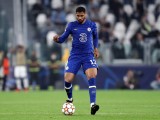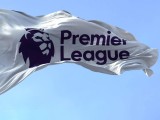Football fans around the world, and particularly in the UK, will be familiar with the voice of former Arsenal and England striker Alan Smith. After working on Sky Sports for many years, and featuring on the global sensation that is the FIFA videogame franchise for almost a decade, Alan's voice has been heard by millions of football fans over a consistent period of time. Generations of fans have now grown up watching football and playing games with Alan, often alongside Martin Tyler, providing the perfect soundtrack.
But what is it actually like to be a football broadcaster? What are the challenges? How does it all work? What are the highlights?
Alan was generous enough to give us his insights into what it's like working as a co-commentator and pundit for Sky Sports, hearing his own voice on the world famous FIFA games, and some of the most memorable moments of his broadcasting career so far.
Q. How did you get started in broadcasting? Did you start with Sky Sports after retiring from football or did you do any stuff before that?
A. I'd been a guest on Sky live games when I was still a player and I was injured - I was the Arsenal guest - so I'd kind of got a relationship with the company, and when I retired I started doing more studio work when Arsenal had live games, and it went from there. I started doing some Soccer Saturday stuff and stuff in the Sky Sports News studio, and then one day I was asked if I fancied doing some co-commentary. I didn't initially fancy it, I didn't think I'd be suited to it, but I had a go, and I've not looked back since.
Q. As an ex-pro, how difficult was it in the beginning to be honest with any criticism of a player or team when you needed to be? (perhaps one that you have a personal relationship with or otherwise) Did you ever feel hamstrung by that?
A. I think it's a familiar problem for players retiring from the game, as to how honest to be. I think I'm naturally quite honest, and somebody that will say what I think, to a certain extent. The one game where I upset my former club was the game at Old Trafford between Arsenal and Manchester United, when there was the ruckus at the end, when Martin Keown jumped up and landed on Ruud Van Nistelrooy. Richard Keys asked for my opinion and I gave an honest opinion, that I thought Arsenal had overstepped the line on that occasion. I think that moment put a bit of distance between me and the club and helped me gain a bit of credibility, so it was a good thing ultimately. If you're gonna go into the punditry world, you won't get too much respect if you chose who you're gonna be critical about and go easy on others, so that was quite an important time for me.
Q. What was the hardest thing also about transitioning from a player into a broadcaster, as far as differences in scheduling, lifestyle, work ethic, mentality and such?
A. It's chalk and cheese really, from playing to talking about it. The first thing is you miss your teammates. That was the biggest thing for me. I didn't so much miss the glory, the roar of the crowd and all that - it's your teammates that you see every morning and have a laugh with, and then all of a sudden, you're outside that circle, which is a tough thing. But I'm a conscientious sort, and I got my head down and tried to do my best.
Q. Did you find you were able to start building the same type of camaraderie with the Sky Sports broadcasters?
A.Well of course on the team there are a lot of ex-footballers who have that same mentality and similar sense of humour, so that makes it easier definitely. There's people that you know, that you maybe played with or against at some stage, so it wasn't too bad on that front. But you're learning a whole new skill and you have to take it seriously.
Q. Have you ever had any individual players call you out on your criticism a la John Terry on Robbie Savage?
A. Quite often people will just be upset about what you've said or what you've written and not actually talk to you directly about it. I've often interviewed players for The Telegraph and I think Sami Hyypia actually didn't want to do it because he'd seen something I'd said or read something I'd written about him previously, which I was racking my brains to think of but couldn't remember. It goes with the territory. As a footballer, you do remember your critics, so I'm not gonna criticise players too much for reacting that way - that's just how it is. In my job, you have to say what you see.
Q. As we mourn the passing of legendary commentator John Motson, do you remember having any broadcasting figures who you looked up to and wanted to emulate, or is it different when you're coming at it as an ex-pro?
A. The co-commentary job is a lot different to the commentator job obviously, so it's not like I wanted to emulate John Motson or Barry Davies or someone. I love Motty as a commentator. Like a lot of people, he was the soundtrack to our lives, but my job was much different to what he did. I think you can learn things off those people though - how to use light and shade in your voice, when to get animated, when to be more conversational, to have a variation in the tone of your voice, so down the years I've heard from a lot of masters of the art, and I've worked with a few, Martin Tyler being one of them - he's been going nearly as long as Motty, so you can learn a lot from these people.
Q. Speaking of being the soundtrack to people's lives, what was it like being the voice of the FIFA videogame franchise for so long? Do you ever get people, especially younger people, approaching you to talk about your work on those games?
A. God yeah! Quite often to be honest with you. They recognise me more from hearing my voice rather than from seeing my face sometimes. You earn a whole new audience, and have kids wanting to take photos with you who wouldn't even remember you as a player, and probably don't even hear you much on Sky, but they play FIFA, so that was a wonderful association and I loved working on that.
Q. How does that work on a practical level, in terms of your input on those projects? When you were doing it with Martin Tyler, were you in different booths or did you record together? How did that work?
A. Same booth. You go in, have a chat with the producer, find out what you're doing that day, and they'll have a script of what you are going to talk about, but you're not repeating what's on the script. It just tells you scenarios, like free kicks from just outside the box, or whatever, and it's up to you to give six or seven different bits of content, so the player isn't hearing the same description every time, which I understand was sometimes the case on the early games of FIFA. That takes a lot of imagination, thinking on your feet, using different words, so you have to have quite a good vocabulary. With Martin there alongside me, we could bounce off each other, and they like to make it as similar to the real thing as possible, so it didn't have to be word perfect - it's as if it was live commentary, that's the feeling they wanted to give it. It was great. People ask me all the time if we were just reading off a script. We never had any action to commentate to, it was all in our imagination.
Q. Did you ever actually play any of the games, or would that have been a bit of a busman's holiday for you, having worked on them and with your voice being all over them?
A. I didn't, to be honest with you. I've got two daughters and they didn't play it. I've got a couple of nephews who did play it. A lot of my friends' kids (sons mainly) did play it. I remember when my girls were at university, me and my wife went to see one of them at their halls of residence and it was in the summer and all the windows were open and I could just hear my voice booming out of the windows.
Q. How easy is it to keep yourself in check and remain neutral when commentating on a team you love?
A. I've never felt that kind of thing difficult. My main concern when I put the microphone to my mouth is to do a good job and to represent both sets of fans equally and fairly. Nobody wants to listen to a biased commentator, it's just not right. It's about capturing the moment. I try to do the best I can and give a soundtrack to that dramatic moment, because it's gonna be replayed many, many times, and my words need to match the level of drama. That's what I'm always trying to do, to make sure my words are as good as the pictures.
Q. Do you ever feel pressure when commentating on the biggest moments of the biggest games, knowing that a clip of what you're saying is going to be immortalised and likely to be viewed millions of times for years to come?
A. Yeah, definitely. You know when a big moment has happened, like a big goal on the big stage, and you get a few seconds to decide what you're gonna say whilst the commentator is doing their bit, and sometimes you'll leave a bit of space after the commentator has finished, just to let the pictures breathe, and for the crowd noise to come across through the TV. You don't want to always be filling the airwaves with your voices, so you leave a little bit of time, but you're thinking about what the best thing to say is. I'll never forget the Manchester derby when Wayne Rooney scored the overhead kick, and I was with Martin Tyler on that occasion, and I thought he might have said all there was to say, but then I had to talk over about four replays, but thankfully I managed to do okay and offer something different. That's the key. Don't repeat what the commentator's just said. Try to talk from the player's perspective, and give that insight - try and explain what the player was doing and how he did it. So yeah, you do get a sense of occasion and that you need to step up and do a good job.
Q. You've commentated on some of the biggest football moments of recent generations. Do any particularly come to mind that you'll never forget?
A. It's difficult, but I think the two Champions League finals. I did the one in Berlin with Juventus and Barcelona, which Barcelona won, and I did the one at Wembley with Barcelona and Man United, when I think Barcelona were the best team they'd ever had, and they pretty much wiped the floor with Man United. In terms of occasion, they were probably the biggest. I've done some great games in the Premier League, some of the relegation clashes have been so tense. I remember one with Sheffield United and Wigan, when Wigan just about survived, and you see all the faces afterwards and they're so relieved, and you're hearing the scorelines coming in from the other games, and one minute this side is safe and the next they're down, and we're cutting to the fans in the crowd and seeing all the tension on their faces - I think some of those relegation ones have been the most dramatic. In terms of career highlights, I have to mention the World Cup final in Qatar. That was definitely the highlight of my commentary career. It was such an incredible match and I was pleased with my performance.
Q. What are you up to right now? How involved are you with Sky and are you working on any other projects or with any other broadcasters?
A. I did the World Cup for the host broadcaster, which was the world feed and went around to a lot of people in English speaking countries, like Canada, most of Africa, the Far East, Australia, and I do a similar thing for the Champions League, which isn't broadcast in the UK but goes all around the world. I did the Liverpool and Real Madrid game the other night with Martin Tyler actually. I'm not doing any writing at the moment, which I've otherwise always done. I did write my own book which came out in 2018, my autobiography. Maybe there's another book in me, but it is mainly Sky at the moment. Next I've got Southampton vs Leicester this Saturday - two teams at the bottom fighting for their lives, and these are the occasions which can be so dramatic - you never quite know how they are going to pan out.
Be sure to head back to Sporticos for more Sports Streams News.












